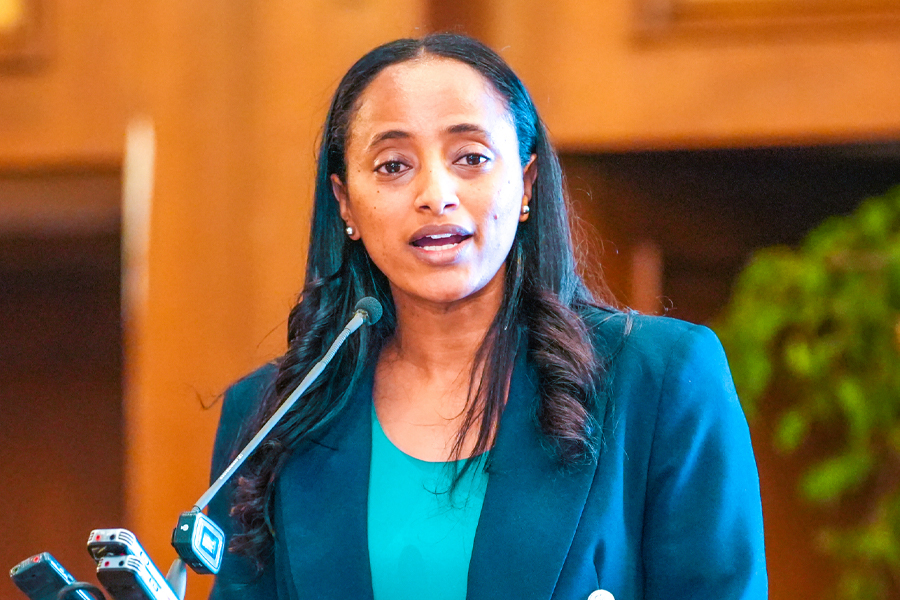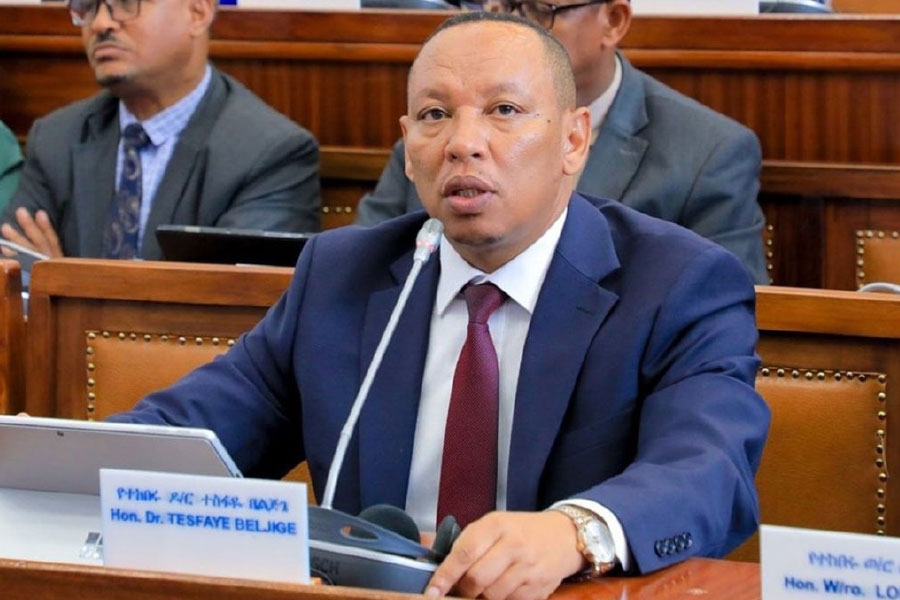
Fortune News | Jun 24,2023
May 16 , 2020
By MAYA MISIKIR ( FORTUNE STAFF WRITER )
The Jobs Creation Commission has partnered with two overseas institutions to digitalise the country's labour market information system for a total investment of one million dollars.
The Commission signed a partnership agreement with Zenysis Technologies Inc., the system developer, and Big Win Philanthropy, the financier, to create the country's first National Labour Market Information System within six months. The system will integrate data from government institutions, non-profits and private businesses.
The system, which is believed to enable better policymaking decisions in the country, will be funded by Big Win Philanthropy, a foundation that supports African countries investing in brain development, youth employment, education and productivity.
The Commission will be providing raw data to Zenysis, the United States tech company from Silicon Valley that will be producing analysis based on requested indicators.
Big Win will invest half a million dollars as a start in the system, which will be using data collected from the Commission's mobile app, Ethioworks. The app was rolled out over half a year ago across 121 weredasat One-Stop Service Centres to collect data. Using over 2,000 centres, the Commission has registered 13,000 job seekers so far and is operational in Addis Abeba, Dire Dawa and Harar.
The Centres have 29 data collection templates, and while the application is currently being used for collecting data, eventually job seekers will be able to use it and directly register themselves, according to Yoseph Sartie, data analytics & system director at the Commission, which aims to create three million jobs this year.
Administrative data will also be collected through different private businesses, non-profit organisations and ministries throughout the country, according to Yoseph.
"Census data and monthly reports from different regions collected through the Commission will also be incorporated," he added.
The project upon completion and evaluation is expected to continue for an additional six months with a corresponding fund of half a million dollars from Big Win.
The Commission and Zenysis have created a core technical committee to enable the Commission to take over the system when Zenysis hands it over. A steering committee made up of the Commission and Big Win will also be closely following up on the project.
While the Commission is confident that it will be successful, there are challenges that it is expecting to face.
"It'll be difficult to get comprehensive and quality data since we don't have a strong culture of data collection even though our institutions are old," said Yoseph.
The Commission uses electronic tablets to gather data at its different centres, and this is expected to put a strain on available resources. The electronic tablets need internet connections, raising costs even further.
Once the data has been collected, it will be analysed, and the Commission is tasked with reporting its findings and creating a dashboard that can be used by the government on federal and regional levels.
This can further help compare and contrast differences between regions and will be useful in better understanding the labour market in the country, according to Yoseph.
"Understanding the labour market will be important in better equipping job seekers in terms of what education and skill sets are in demand, as well as understanding what employers are looking for," he said.
The analysed data can reduce the mismatch of jobs and better align job seekers with prospective employers offering pay that is appropriate for their education and skill level. It is hoped that this will help revitalise the economy. This, in turn, will be used as a tool for policy creation by the government to enhance the economy further.
The system will also complement the government's initiative for digitisation of services at a national level through a Digital Transformation Strategy.
"We've fallen behind in contrast to the rest of the world, but the onset of COVID-19 has hastened our entry into the digital economy," said Tesfaye Alemnew, media and press service director at the Ministry of Innovation and Technology.
The challenges to the digitalisation of data in the country stem from multiple factors, according to Social Beyene, co-founder and CEO of DAFTech Social ICT Solution PLC.
"Most staff work based on experience with no formal data cataloguing or arranging methodologies. There is also a reluctance to switch to this system from old school filing methods," Social said. "Though there is an understanding that digitisation of data is important, there needs to be more decisiveness coming from the top he advises. "If everyone works as if their job is on the line, then we can get more done."
More funds and skilled human resources need to be allocated to this effort, Social recommended.
PUBLISHED ON
May 16,2020 [ VOL
21 , NO
1046]

Fortune News | Jun 24,2023

Agenda | Mar 28,2020

Radar | Apr 27,2025

Commentaries | Aug 03,2024

Commentaries | May 18,2019

Editorial | Nov 18,2023

Fortune News | Jun 19,2021

Agenda | Jan 09,2021

Agenda |

Fortune News | Jun 20,2025

Dec 22 , 2024 . By TIZITA SHEWAFERAW
Charged with transforming colossal state-owned enterprises into modern and competitiv...

Aug 18 , 2024 . By AKSAH ITALO
Although predictable Yonas Zerihun's job in the ride-hailing service is not immune to...

Jul 28 , 2024 . By TIZITA SHEWAFERAW
Unhabitual, perhaps too many, Samuel Gebreyohannes, 38, used to occasionally enjoy a couple of beers at breakfast. However, he recently swit...

Jul 13 , 2024 . By AKSAH ITALO
Investors who rely on tractors, trucks, and field vehicles for commuting, transporting commodities, and f...

Oct 4 , 2025
Eyob Tekalegn (PhD) had been in the Governor's chair for only weeks when, on Septembe...

Sep 27 , 2025
Four years into an experiment with “shock therapy” in education, the national moo...

Sep 20 , 2025
Getachew Reda's return to the national stage was always going to stir attention. Once...

Sep 13 , 2025
At its launch in Nairobi two years ago, the Africa Climate Summit was billed as the f...